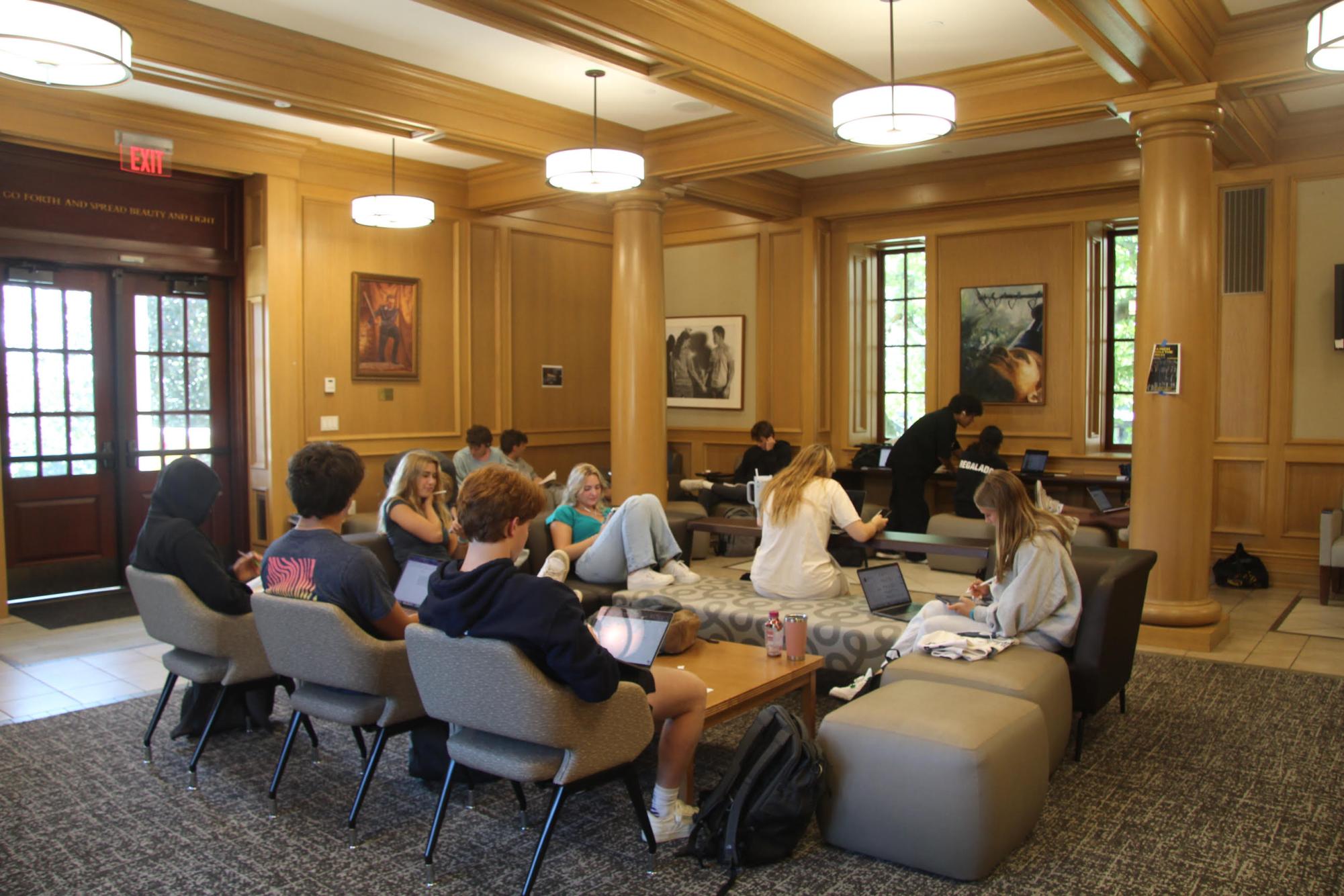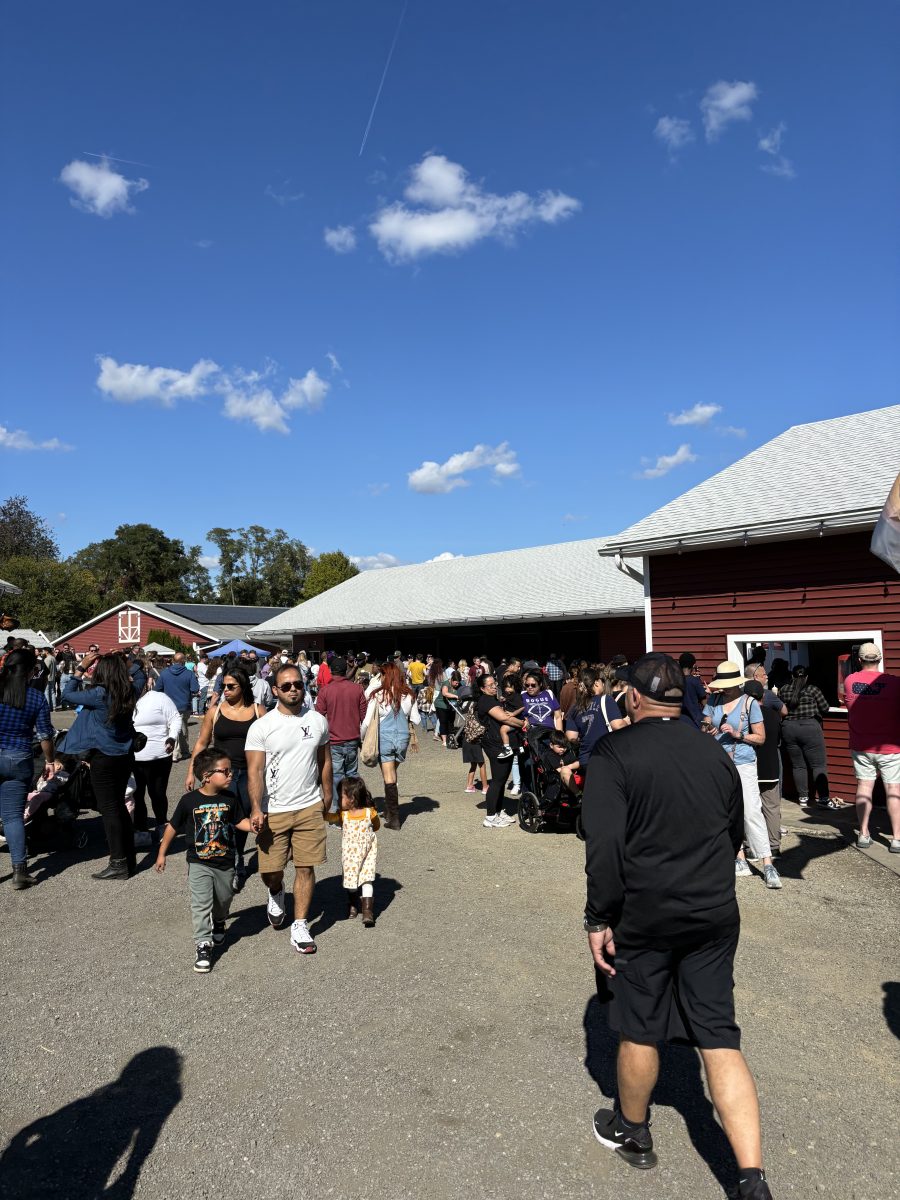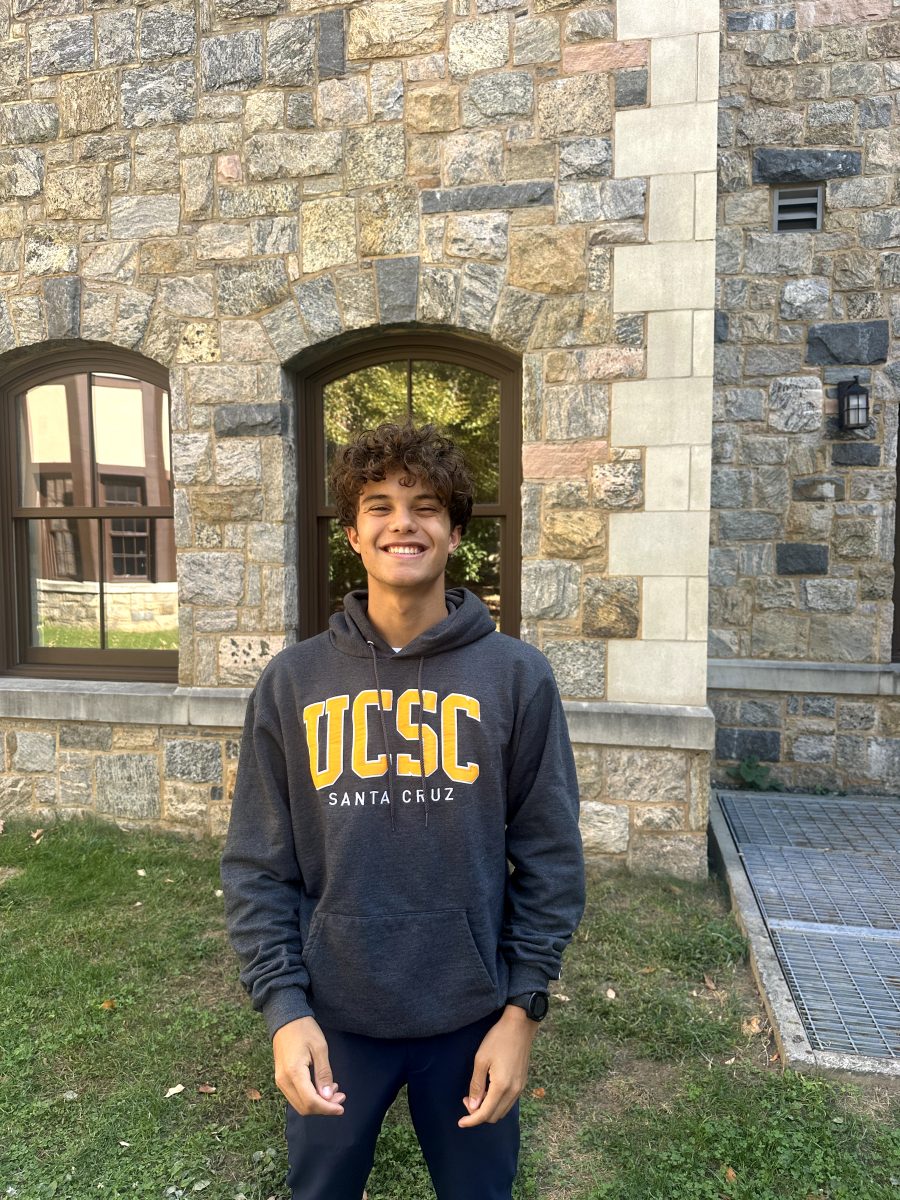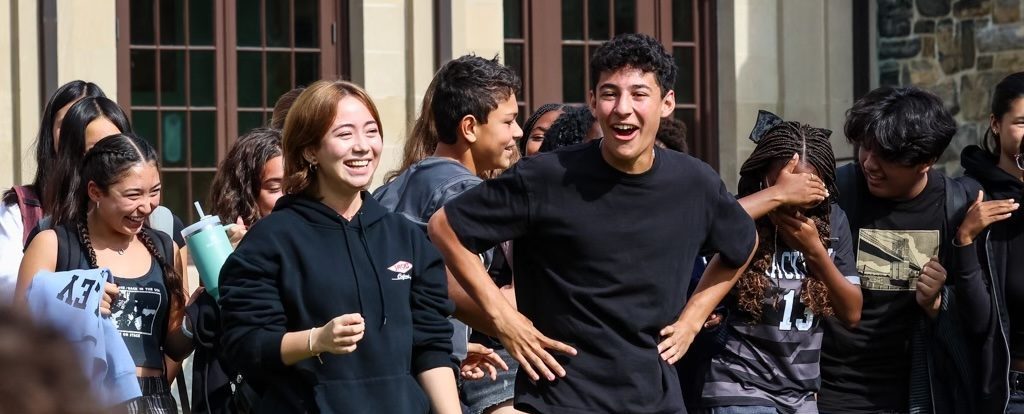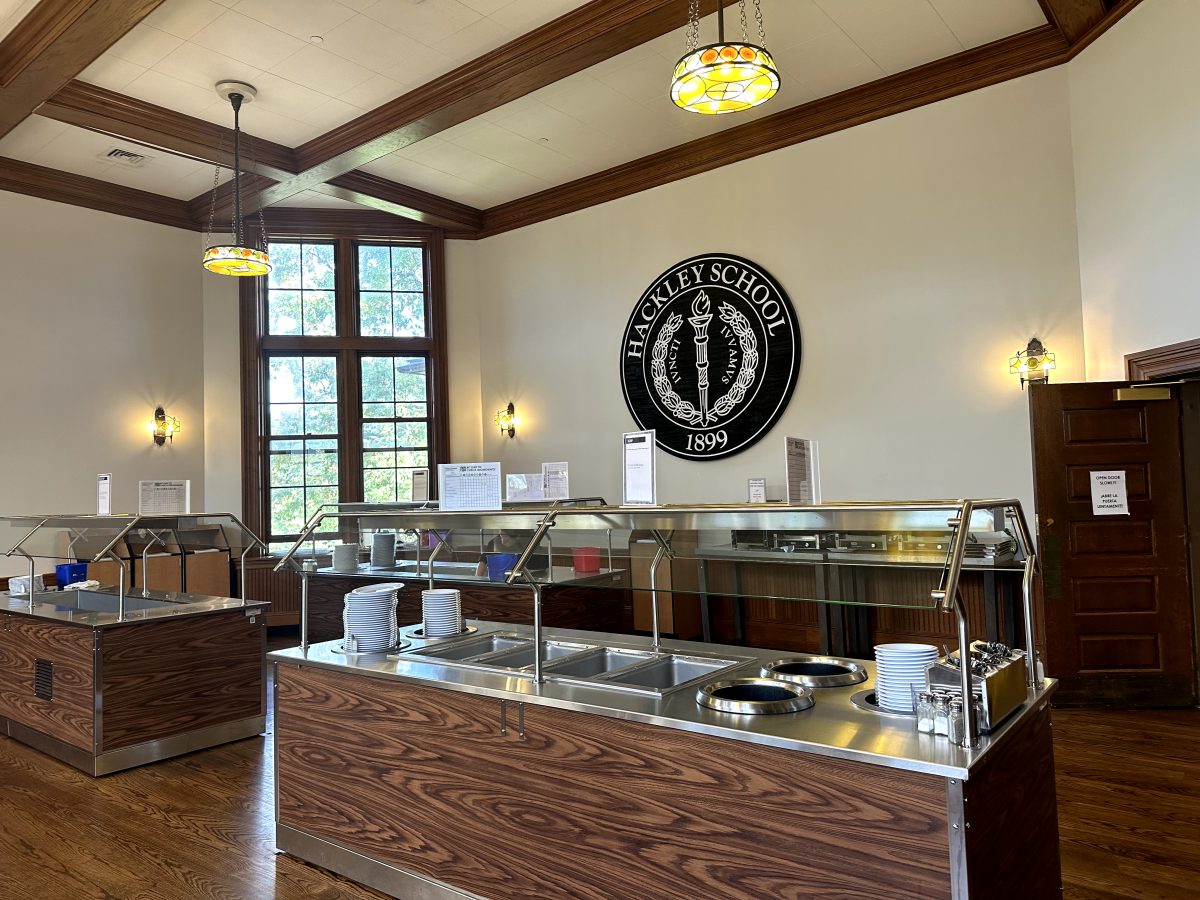One day this fall, seniors entering the senior lounge were surprised to find new furniture waiting for them. Since then, some students have been questioning: are there greater needs at Hackley that could have used the funding? The Dial explored students’ questions and sought answers.
On September 19th, the seniors walked into school ready to learn and congregate in the senior lounge as normal, but as they walked in many were surprised to see the new and improved space. The brown leather couches were replaced with new gray and black ones.
Although some were excited about this new change, others deemed it unnecessary.
“I feel neutral to this change,” said senior Camille Henderson, however, she added, “Many of the seniors have been saying that it looks more like a hotel lobby, and has less of the cozy and homey feeling.”
Although the couches seem nice, many said that they are less comfortable than the old ones. Students say they don’t want to complain because they are grateful, but they think there are other more prevalent issues that need to be addressed and could have used the funding. Junior Bella Barriera believes that the school should invest money into putting lights at the tennis courts because there are no lights and that can become an inconvenience and create a safety hazard as the sun starts to set sooner when winter approaches.
“Two years ago during the Ivy Finals against Poly, the doubles match went late and it was getting dark, so we had to stop and finish it the next day because we could not see with the lack of light,” she said.
Another issue is the pipes flooding water into a garbage can in the freshman hallway. The hallway appeared to be having problems
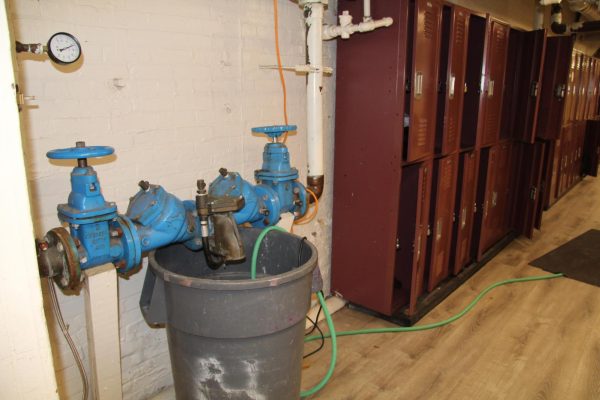
Upper School students, specifically the freshmen, were upset with the water issues occurring in their hallway. There was a garbage can collecting water from a spout for a month, along with hoses flowing in and out of the garbage. This was all due to a plumbing issue that the freshmen hallway was experiencing.
with pipes, causing a garbage can to be placed there to catch the flooding water. Many freshmen were upset by this situation because of how long it had been happening. This was an ongoing issue for three to four weeks this fall and even got so bad that one day Buildings & Grounds workers caution-taped the hallway off and people were not able to congregate there. This disrupted the daily flow of the freshmen and the other high school students who used that hallway as a more efficient way to get to class.
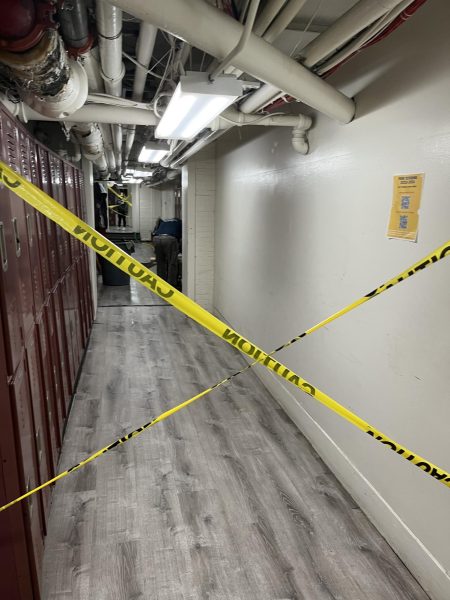
One afternoon, the freshmen hallway was caution taped off due to the plumbing issues it was experiencing. This caused a disruption to the students who use this space to store their bags and access their lockers. Additionally, it was a disruption to the students who use this hallway as an efficient way to get to class.
“The garbage has been collecting water for weeks, it’s disgusting and a waste of water,” said junior Fox Quattrone indicating that this had been an ongoing issue.
Freshman Andre McMahon said, “I think they need to fix it soon, and they definitely should not be showing it on tours of the school.”
Although the water issue is now fixed, many are questioning why the school let the garbage collect water for so many weeks without fixing it sooner. Did it have to do with funding?
Addressing the freshman hallway, Director of the Upper School, Andy King said, “We had a power outage that messed up something in our plumbing system and we did not anticipate that expense or say that we needed to set aside that money for the plumbing repair.” Even though that issue was not budgeted for, they had money to eventually fix it because of their contingency budget which is for when unplanned incidents like this occur.
Regarding more issues that could be fixed, senior Alex Schiller said, “Ms. Baal’s floor.”
Others noted the hazardous floor in Allison Baal’s History classroom and said that parts of the floorboards are coming up which is dangerous because multiple people have nearly tripped walking by it.
“So many Goodhue floors have popped up and people have tripped over it, it is literally a hazard,” said Junior Hailey Won, “they should be focusing on our classrooms first.”
This raises many questions about what a proper funding balance is and what that would look like for a school like Hackley. Should administrators be taking into account the opinion of the students and what issues students think could be resolved to make Hackley an even better learning environment?
The general consensus is yes, it seems administrators need to focus funding on issues that are directly affecting students’ and teachers’ daily routines instead of sprucing up the decorative furniture in the lounge.
“The funding at Hackley feels like we are not fixing the real problems,” said junior Hailey Won.
Opinions surrounding funding choices seem to be caused by students’ lack of knowledge surrounding how decisions in budgeting and funding are made at Hackley. This is mainly because the administration does not involve the student voice in the budgeting and funding process. Perhaps a general understanding of Hackley’s system surrounding budgeting and funding would benefit all members of the Hackley community, especially students who have lingering questions about how these decisions are made.
To understand this topic better, it is important to not only consider the opinions of the students but also why and how decisions are made in funding and budgeting.
Regarding the furniture in the senior lounge, Mr. King explained how he did not have much of a say in these decisions, but that, “There is some mental math about the wear and tear and when furniture should be replaced.” He added that is the likely reason for this change.
Head of School Charles Franklin similarly noted, “While we want to be good stewards of all resources and be thoughtful of overspending money, there is a shelf life for everything, for example, we know that every 20 years the roof has to be redone and every eight to 11 years the boilers in the basement have to be done.” He explained how this is likely the reason for the change of couches in the senior lounge. Hackley’s budget contains a cycle to periodically replace things so that they do not get to a point where they need to replace a lot of things at once. Mr. Franklin called this a “steady replacement cycle.”
While there may be other ongoing issues at Hackley, it is still important to invest in replacing things on a cycle to not have many unbudgeted expenses build up causing a big expense at once.
Regarding the current seniors’ confusion on the investment of the new furniture in the Senior Lounge, Mr. King said, “It’s a fair point, why do that and not something else?”
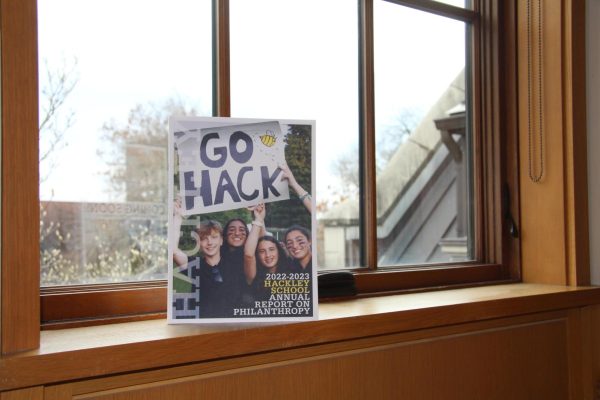
Hackley’s Annual Report on Philanthropy can be found lying around the hallways and is Ms.Coy’s office. This magazine allows members of the Hackley community to see where a lot of money comes from and where it goes. This can help clear up questions people may have regarding where money for budgeting and funding comes from.
There is a magazine titled Annual Report on Philanthropy that people can find lying around in the Upper School hallways. This magazine shows the school’s expenses and how much money goes where. Mr. King said this report can give students with questions a “perspective on the overall budget.”
The school’s overall budget gets created in the fall and early winter and then is finished by that winter and is implemented the following school year. During this process, administrators compile a variety of information including things that are included in the budget every year, and new things for the upcoming year. After it is created it is reviewed by the people on the finance committee and other administrators. This budget process also involves members of admissions because how many students they admit will indicate how much revenue the school will gain from tuition.
Mr. Franklin summed up the budgeting process as, “Making sure we provide the best opportunities and experiences we can for faculty, families, and kids…while also limiting costs.”
Reflecting on the occasional unpredictability of budgeting, Mr. King explained how, “Sometimes things get thrown in the way [while budgeting],” and he gave the example of the Covid-19 Pandemic. Nobody budgeted for a Zoom license or the spit testing which were additional costs the school had to pay.
Mr. King pointed out, “You have to have both discipline and flexibility in your budget process because events happen.” A prime example of this was the water issues in the freshman hallway which was an unplanned incident, but one that needed to be resolved.
Hackley’s budget contains a priority list. Last year, one of the priorities was to purchase new touch panels in the classrooms and they were able to implement that by placing it towards the top of the priority list.
For this year, Mr. Franklin explained, “There’s one thing we talk about all the time during the budgeting process, and that is the student experience.” Hackley’s first budgeting priority for this year is focusing on the student experience, so when they are deciding to increase or decrease the budget in any particular area, they focus on how it is directly impacting the student experience, whether that be positively or negatively.
Another budgeting priority for this year is the new Center for Creative Arts and Technology that will be opening soon. They are planning to set aside money for holding opening events and also to fill the new center with new supplies, technology, and furniture.
Many members of the Hackley community get involved in the creation of the “priority list”. Department chairs will discuss their wishes with their colleagues and create a list of things they want. All of the department’s wishes then get put on one master document with all the school’s wishes. These departments include not only academic departments but also faculty from the arts departments, athletics, admissions, and Building & Grounds.
When discussing the difficulty of a priority list, Mr. Franklin noted, “A very challenging part is that they are all very good ideas and how do we narrow it down to the ones that have the best impact?”
He explained how Hackley must say no to a range of ideas because they have to keep costs down so that they can keep tuition from rising too quickly. “That is a big challenge for schools because we can keep growing the program, but we can’t keep raising tuition blindly.”
Regarding student involvement in this process, Mr. Franklin noted, “I don’t know, how do we get student perspective in that, that is a really good question that we can think more about.” He suggested we could do this through Community Council or clubs so that students can involve their voices and wishes through this process, just like the faculty.
When deciding what gets put at the top of the priority list, Mr. Franklin said, “It’s probably more of an art than a science.” Hackley looks at what will make the most impact for the most students and how they can invest money to help the community. For example, Hackley would be better off investing in something that would impact a whole grade rather than a class with fifteen students. Additionally, there are also things that need to be at the top of the list. For example, if the science classes need beakers so that they can conduct experiments throughout the year, then the beakers would be at the top of the list because not having them would impact the science program at Hackley. This connects to the furniture in the senior lounge because the couches became a need and reached the top of the priority list because of Hackley’s replacement cycle.
“The dilemma that independent schools face is how do you ever control cost in a way that doesn’t adversely impact the student experience, it’s challenging, especially when you charge a high tuition,” said Mr. King. Hackley’s solution to this is prioritization and generating a wish list.
A major factor to consider when looking at funding at Hackley is that Hackley is a K-12 school, so not all of the money can go to the Upper School. There has to be a balance between the Lower, Middle, and Upper Schools, all while funding other programs such as the arts, athletics, and boarding.
“It’s like a balancing act,” said Mr. King.


